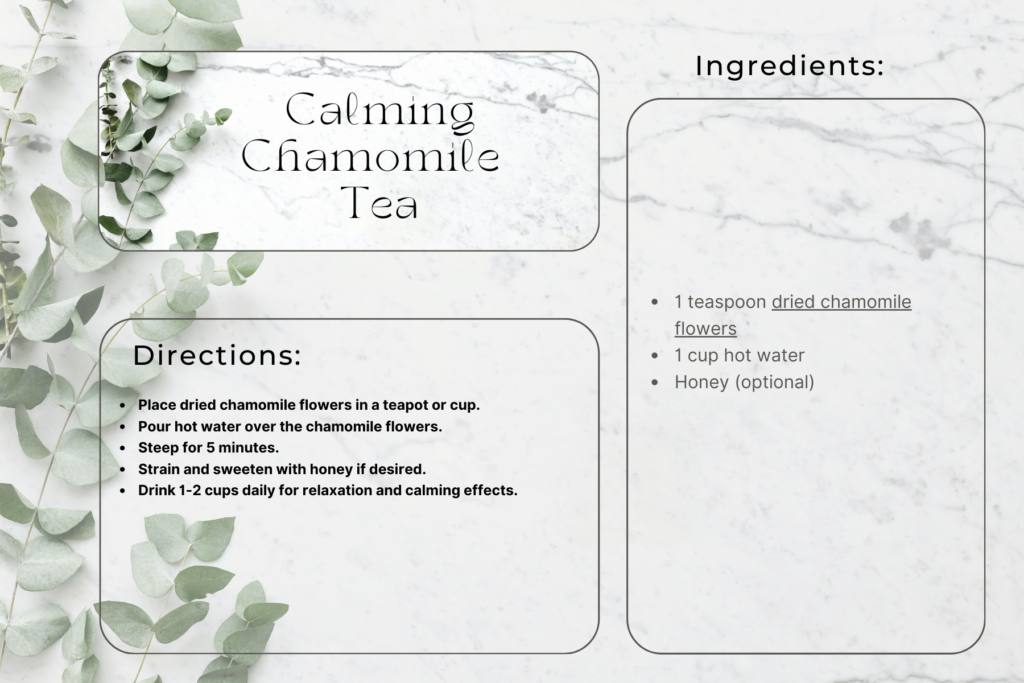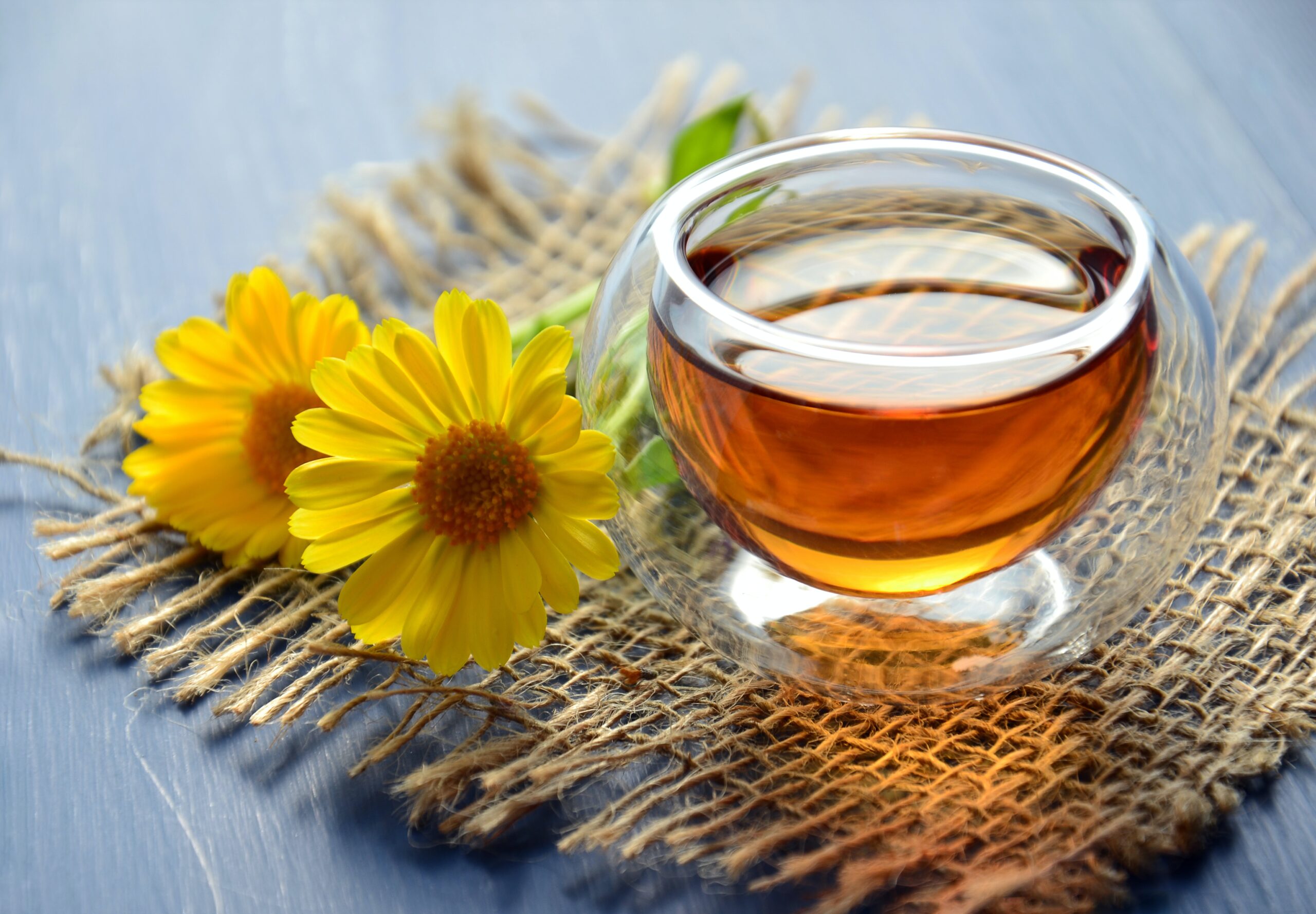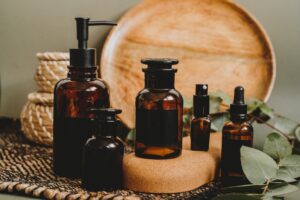Ingredients:
- 1 teaspoon dried chamomile flowers
- 1 cup hot water
- Honey (optional)
Instructions:
- Place dried chamomile flowers in a teapot or cup.
- Pour hot water over the chamomile flowers.
- Steep for 5 minutes.
- Strain and sweeten with honey if desired.
- Drink 1-2 cups daily for relaxation and calming effects.
A Fun Fact You Can Share
Here’s a fun fact about chamomile: While chamomile is widely known for its calming properties, especially in the form of tea, not many people are aware that it belongs to the Asteraceae family, which also includes sunflowers and marigolds. The tiny, daisy-like flowers of chamomile may seem unassuming, but they hold a delightful secret—they are a part of a large and diverse plant family with a variety of shapes, sizes and uses.
Article Continues Below
Calming Chamomile Tea
Experience the art of tea with the RORA Lazy Kungfu Glass Tea Set. Crafted from high-quality borosilicate glass, this set is perfect for blooming tea, ensuring both heat resistance and durability. The masterful design features a gooseneck non-drip water outlet for a smooth flow, preventing splashing. The automatic water injection system, facilitated by a removable infuser, simplifies the brewing process. With a firm grip handle and easy-to-clean design, this tea set is a blend of elegance and functionality. Embrace convenience and style while savoring the rich flavors of scented tea, loose leaf tea, or fruit tea. Check It Out!
Read Our Affiliate Disclaimer
Calming Chamomile Tea
Article Continues Below
Calming Chamomile Tea
Calming Chamomile Tea has long been recognized for its soothing properties and is often recommended as a natural remedy for various mental and emotional imbalances.
Chamomile has a rich history that dates back thousands of years. The herb derives its name from the Greek words “khamai” (meaning “on the ground”) and “melon” (meaning “apple”) due to its pleasant apple-like aroma. The two most common types of chamomile used in teas are German chamomile (Matricaria chamomilla) and Roman chamomile (Chamaemelum nobile).
Chamomile tea has been consumed for centuries across various cultures, including Ancient Egypt, Greece and Rome. It was highly regarded for its medicinal properties and was commonly used to treat ailments related to sleep, digestion and relaxation.
Today, chamomile tea remains a popular herbal remedy worldwide. It is widely available and can be prepared by steeping dried chamomile flowers in hot water. The resulting infusion has a light golden color and a mild, floral taste.
It’s important to note that while chamomile tea is generally considered safe, individuals with allergies to plants in the daisy family (such as ragweed) should exercise caution. Additionally, it’s always advisable to consult with a healthcare professional, particularly if you have specific health concerns or are taking medications.
Overall, Calming Chamomile Tea can be a gentle and natural addition to a holistic approach to mental well-being, providing relaxation, mood support, and potential relief from symptoms associated with mental disregulations.
Benefits of Calming Chamomile Tea for Mental Disregulations
Anxiety and Stress Relief: Chamomile contains compounds that may help reduce anxiety symptoms and promote relaxation. It is often used as a mild sedative and can provide a sense of calmness, making it beneficial for individuals with ADHD, bipolar disorder, or rejection dysphoria who may experience heightened stress or anxiety.
Sleep Aid: Many individuals with mental disregulations, such as ADHD or bipolar disorder, often struggle with sleep disturbances. Chamomile tea is known for its sleep-inducing properties and can help improve sleep quality. Better sleep can positively impact mood stability, cognitive function, and overall well-being.
Mood Regulation: Chamomile tea may have mood-regulating effects, potentially helping individuals with bipolar disorder by reducing symptoms of depression and mania. Its gentle calming properties can promote emotional balance and provide relief from mood swings.
Digestive Support: Mental disregulations can sometimes be accompanied by digestive issues, such as irritable bowel syndrome (IBS) or gastrointestinal discomfort. Chamomile tea has been traditionally used to soothe the digestive system, reducing symptoms like bloating, cramping, and indigestion.
The Properties of the Chamomile Flower
The properties of the chamomile flower work in the human brain through its interaction with various chemical compounds. Chamomile contains flavonoids, terpenoids, and other bioactive compounds that can cross the blood-brain barrier and exert their effects on the central nervous system. These compounds interact with receptors in the brain, including GABA receptors, which are responsible for promoting relaxation and reducing anxiety. By binding to these receptors, chamomile may enhance the inhibitory effects of GABA, leading to a calming and soothing effect on the brain.
Furthermore, chamomile’s bioactive compounds may also modulate the release and activity of neurotransmitters like serotonin, dopamine, and norepinephrine, which play essential roles in mood regulation. This modulation can contribute to the mood-stabilizing and anxiety-reducing effects of chamomile. Overall, chamomile’s properties work synergistically to promote relaxation, reduce anxiety, and support overall mental well-being.

Cautions to Consider
While chamomile tea is generally considered safe for most people, there are a few cautions to consider when introducing it into your diet.
Allergies: Individuals with allergies to plants in the daisy family, such as ragweed, chrysanthemums, or marigolds, may also be allergic to chamomile. It’s important to be aware of any potential allergies and discontinue use if any adverse reactions occur, such as skin rashes, itching, or difficulty breathing.
Pregnancy and Breastfeeding: Pregnant women or those who are breastfeeding should exercise caution when consuming chamomile tea. Although chamomile is generally regarded as safe, it’s recommended to consult with a healthcare professional to determine its suitability during this period.
Medication Interactions: Chamomile tea may interact with certain medications, including blood thinners, sedatives, and anti-anxiety medications. It’s essential to talk to a healthcare professional if you are taking any medications to ensure there are no contraindications or potential interactions.
Sedative Effects: Chamomile tea has mild sedative properties and can promote relaxation. While this can be beneficial for some individuals, it’s important to be mindful of its effects, especially if you are operating machinery or driving a vehicle.
Dosage and Moderation: Like any herbal tea or supplement, it’s important to consume chamomile tea in moderation. Excessive intake may lead to unwanted side effects, such as drowsiness, digestive upset, or allergic reactions. Following the recommended dosage and consulting with a healthcare professional can help ensure safe and appropriate use.
As with any dietary changes or herbal remedies, it’s always advisable to consult with a healthcare professional, especially if you have underlying health conditions, are taking medications or have specific concerns. They can provide personalized guidance and help you determine whether chamomile tea is suitable for you.
You might also be interested in Lavender Bath Salt you can make easily make at home to enhance relaxation.
Disclaimer: The information and/or products mentioned in this article are provided as information resources only and are not to be used or relied on to diagnose, treat, cure or prevent any disease. The statements made in this article have not been evaluated by the Food and Drug Administration. Any products mentioned are not intended to diagnose, treat, cure, or prevent any disease, but rather to be considered as an informational resource only to encourage critical thinking and personal research. The information in this article is intended for educational purposes only. The information is not intended to replace medical advice offered by licensed medical physicians. Please consult your doctor or health care practitioner for any and all medical advice.






